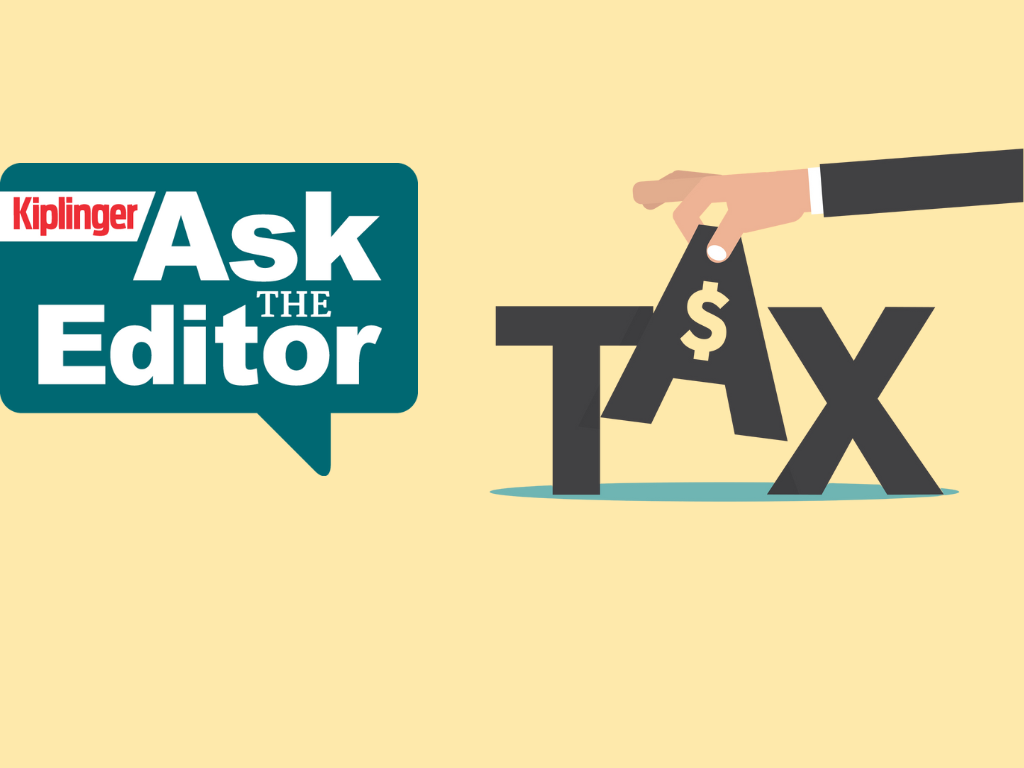Ask the Editor: Reader Questions, April 18 — Amended Returns
In our Ask the Editor series, Joy Taylor, The Kiplinger Tax Letter Editor, answers questions related to amended returns, property and deductions.

Profit and prosper with the best of Kiplinger's advice on investing, taxes, retirement, personal finance and much more. Delivered daily. Enter your email in the box and click Sign Me Up.
You are now subscribed
Your newsletter sign-up was successful
Want to add more newsletters?

Delivered daily
Kiplinger Today
Profit and prosper with the best of Kiplinger's advice on investing, taxes, retirement, personal finance and much more delivered daily. Smart money moves start here.

Sent five days a week
Kiplinger A Step Ahead
Get practical help to make better financial decisions in your everyday life, from spending to savings on top deals.

Delivered daily
Kiplinger Closing Bell
Get today's biggest financial and investing headlines delivered to your inbox every day the U.S. stock market is open.

Sent twice a week
Kiplinger Adviser Intel
Financial pros across the country share best practices and fresh tactics to preserve and grow your wealth.

Delivered weekly
Kiplinger Tax Tips
Trim your federal and state tax bills with practical tax-planning and tax-cutting strategies.

Sent twice a week
Kiplinger Retirement Tips
Your twice-a-week guide to planning and enjoying a financially secure and richly rewarding retirement

Sent bimonthly.
Kiplinger Adviser Angle
Insights for advisers, wealth managers and other financial professionals.

Sent twice a week
Kiplinger Investing Weekly
Your twice-a-week roundup of promising stocks, funds, companies and industries you should consider, ones you should avoid, and why.

Sent weekly for six weeks
Kiplinger Invest for Retirement
Your step-by-step six-part series on how to invest for retirement, from devising a successful strategy to exactly which investments to choose.
Each week, in our Ask the Editor series, Joy Taylor, The Kiplinger Tax Letter Editor, answers questions on topics submitted by readers. This week, she’s looking at questions related to amended returns, reverse mortgages and depreciation deductions. (Get a free issue of The Kiplinger Tax Letter or subscribe.)
Q1: Amended returns
I mailed amended tax returns on Form 1040-X to the IRS in early January. They show up in the IRS system as received by the agency, but I have not yet received my refunds. Do you know when I might see my money?
The IRS is still lagging on processing amended returns. The delay began with the COVID-19 pandemic, and the IRS has not yet fully caught up. But the wait isn’t as bad as it used to be. The IRS says that it is now processing amended paper-filed returns that were received in January 2025, so you should see your refund shortly. Note that the IRS’s processing time is longer for paper returns with errors or paper returns that require special handling. You might want to check the IRS’s online tool, Where’s My Amended Return.
— Joy Taylor, Editor The Kiplinger Tax Letter
Q2: Reverse Mortgages
I am planning to take out a reverse mortgage on my primary home. Will I have to pay federal income tax on the money that I receive in the transaction?
No. The payments you get from a reverse mortgage are treated as nontaxable loan proceeds, not income. Also, if you itemize, you cannot deduct, on Schedule A of the Form 1040, the interest you eventually pay because you are not using the reverse mortgage proceeds to buy, build or substantially improve the home securing the mortgage.
— Joy Taylor, Editor The Kiplinger Tax Letter
From just $107.88 $24.99 for Kiplinger Personal Finance
Become a smarter, better informed investor. Subscribe from just $107.88 $24.99, plus get up to 4 Special Issues

Sign up for Kiplinger’s Free Newsletters
Profit and prosper with the best of expert advice on investing, taxes, retirement, personal finance and more - straight to your e-mail.
Profit and prosper with the best of expert advice - straight to your e-mail.
Q3: Converted Rental Property
I bought a home in 2008 for $294,000 that I used as my primary residence. In 2014, when the property was valued at $225,000, I moved and converted the home to a rental property. I then used $225,000 to calculate depreciation on the rental property. I sold the home last year for $362,000. What is the tax basis for determining the gain on the sale of the rental home?
First, you were correct to use the $225,000 amount for figuring annual depreciation deductions when you converted your primary home to a rental property. Second, since you sold the rental property at a gain last year, your tax basis for determining your gain is the original cost of the home ($294,000) plus any amounts you paid for capital improvements, less depreciation that you deducted on the home. If you had sold the rental home for a loss, your basis starting point would have been the lower of your original basis ($294,000) or the value when you converted the home to a rental ($225,000).
— Joy Taylor, Editor The Kiplinger Tax Letter
Q4: Investment Subscription Costs
I am aware that I cannot deduct the fees I pay to my broker to manage my investments. However, can I deduct the costs of subscriptions to stock advice letters, some of which are quite expensive?
No. Unfortunately, you cannot deduct the cost of subscriptions to stock advice letters unless you use that information in your trade or business. This type of investment expense used to be deductible as a miscellaneous itemized deduction on Schedule A of the Form 1040 (subject to the 2%-of-adjusted-gross-income limit), but the 2017 Tax Cuts and Jobs Act temporarily eliminated that entire group of deductions through the end of 2025. It’s too soon to know whether you would be able to deduct the costs for 2026 and later years. Republican lawmakers are currently negotiating a big tax package that would extend many of the expiring provisions in the Tax Cuts and Jobs Act.
— Joy Taylor, Editor The Kiplinger Tax Letter
Q5: Deducting One’s Time
Can a self-employed person deduct the value of his or her time on Schedule C of the Form 1040?
No. A self-employed person cannot deduct the value of his or her time. As the United States Tax Court said in a recent case, “labor performed by a taxpayer does not constitute an amount paid or incurred by him, and the taxpayer is not entitled to deduct the value of such labor.”
Also, if a self-employed person pays wages to himself or herself, he or she cannot deduct the wages on Schedule C because he or she isn’t employed by the business for tax purposes. The person can take withdrawals from his or her Schedule C business, but those withdrawals aren’t taxable and aren’t deductible.
— Joy Taylor, Editor The Kiplinger Tax Letter
We have already received many questions from readers on topics such as leasing a car for business use, what to do with unused funds in a 529 college savings plan, using U.S. savings bonds to pay for college and much more. We’ll answer some of these in a future Ask the Editor round-up. So keep those questions coming!
Subscribers of The Kiplinger Tax Letter can ask Joy questions about a tax topic. You'll find full details of how to submit questions in The Kiplinger Tax Letter. (Get a free issue of The Kiplinger Tax Letter or subscribe.)
Not all questions submitted will be published, and some may be condensed and/or combined with other similar questions and answers, as required editorially. The answers provided by our editors and experts, in this Q&A series, are for general informational purposes only. While we take reasonable precautions to ensure we provide accurate answers to your questions, this information does not and is not intended to, constitute independent financial, legal, or tax advice. You should not act, or refrain from acting, based on any information provided in this feature. You should consult with a financial or tax advisor regarding any questions you may have in relation to the matters discussed in this article.
Read more
- Ask the Editor, April 11, 2025: Questions about IRAs, RMDs and PTPs.
- Ask the Editor, April 4, 2025: Questions about the new tax bill, estate tax, and muni bonds.
- Ask the Editor, March 28, 2025: Questions about filing tax returns, QBI deductions, and estimated tax payments.
- Ask the Editor, March 21, 2025: Questions on reporting income and deductions.
Profit and prosper with the best of Kiplinger's advice on investing, taxes, retirement, personal finance and much more. Delivered daily. Enter your email in the box and click Sign Me Up.

Joy is an experienced CPA and tax attorney with an L.L.M. in Taxation from New York University School of Law. After many years working for big law and accounting firms, Joy saw the light and now puts her education, legal experience and in-depth knowledge of federal tax law to use writing for Kiplinger. She writes and edits The Kiplinger Tax Letter and contributes federal tax and retirement stories to kiplinger.com and Kiplinger’s Retirement Report. Her articles have been picked up by the Washington Post and other media outlets. Joy has also appeared as a tax expert in newspapers, on television and on radio discussing federal tax developments.
-
 Quiz: Do You Know How to Avoid the "Medigap Trap?"
Quiz: Do You Know How to Avoid the "Medigap Trap?"Quiz Test your basic knowledge of the "Medigap Trap" in our quick quiz.
-
 5 Top Tax-Efficient Mutual Funds for Smarter Investing
5 Top Tax-Efficient Mutual Funds for Smarter InvestingMutual funds are many things, but "tax-friendly" usually isn't one of them. These are the exceptions.
-
 AI Sparks Existential Crisis for Software Stocks
AI Sparks Existential Crisis for Software StocksThe Kiplinger Letter Fears that SaaS subscription software could be rendered obsolete by artificial intelligence make investors jittery.
-
 Ask the Editor, February 13: More Questions on IRAs
Ask the Editor, February 13: More Questions on IRAsAsk the Editor In this week's Ask the Editor Q&A, Joy Taylor answers questions on IRAs
-
 How to Open Your Kid's $1,000 Trump Account
How to Open Your Kid's $1,000 Trump AccountTax Breaks Filing income taxes in 2026? You won't want to miss Form 4547 to claim a $1,000 Trump Account for your child.
-
 7 Bad Tax Habits to Kick Right Now
7 Bad Tax Habits to Kick Right NowTax Tips Ditch these seven common habits to sidestep IRS red flags for a smoother, faster 2026 income tax filing.
-
 Ask the Editor, February 6: Questions on Federal Income Tax Deductions
Ask the Editor, February 6: Questions on Federal Income Tax DeductionsAsk the Editor In this week's Ask the Editor Q&A, Joy Taylor answers questions on federal income tax deductions
-
 Should You Do Your Own Taxes This Year or Hire a Pro?
Should You Do Your Own Taxes This Year or Hire a Pro?Taxes Doing your own taxes isn’t easy, and hiring a tax pro isn’t cheap. Here’s a guide to help you figure out whether to tackle the job on your own or hire a professional.
-
 Ask the Editor, January 30: Questions on Social Security Benefits Taxation
Ask the Editor, January 30: Questions on Social Security Benefits TaxationAsk the Editor In this week's Ask the Editor Q&A, Joy Taylor answers questions on the taxation of Social Security benefits
-
 Don't Overpay the IRS: 6 Tax Mistakes That Could Be Raising Your Bill
Don't Overpay the IRS: 6 Tax Mistakes That Could Be Raising Your BillTax Tips Is your income tax bill bigger than expected? Here's how you should prepare for next year.
-
 Will IRS Budget Cuts Disrupt Tax Season? What You Need to Know
Will IRS Budget Cuts Disrupt Tax Season? What You Need to KnowTaxes The 2026 tax season could be an unprecedented one for the IRS. Here’s how you can be proactive to keep up with the status of your return.